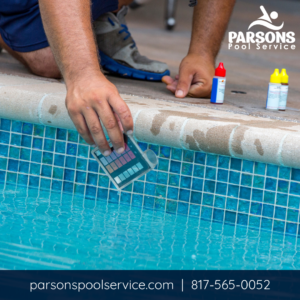Pool water needs to be balanced
Your pool is a big investment, and keeping the water properly balanced is key to protecting that investment. Pool water that is not properly balanced can lead to a number of problems, including:
- Corrosion of metal surfaces
- Staining of surfaces
- Scale build-up
- Cloudy water
All of these problems can be costly to repair, and some (like staining) may be permanent. In addition, poorly balanced pool water can be uncomfortable for swimmers, causing skin and eye irritation. It can also promote the growth of algae.
Fortunately, balancing your pool water is relatively simple. You’ll need to test the pH and alkalinity levels regularly, and adjust as needed. You’re also going to need to test your water’s total hardness.
What is pH?
A pool’s pH level is a measure of its acidity and alkalinity. pH stands for “potential hydrogen” and is measured on a scale of 0 to 14. The lower the pH, the more acidic the pool water is; the higher the pH, the more alkaline the pool water is.
Why does pH matter?
The ideal pH for a swimming pool is between 7.4 and 7.6. This range is considered neutral, meaning neither too acidic nor too alkaline. Water that is too acidic can cause skin and eye irritation, while water that is too alkaline can make it difficult to swim and can also cause skin and eye irritation.
It’s important to test your pool’s pH levels regularly and adjust them as needed to maintain a neutral pH.
Alkalinity: what it is and why it matters
Maintaining the alkalinity levels in your pool is important for a number of reasons. Alkalinity helps to stabilize the pH levels in your pool, which can fluctuate due to a number of factors, including weather and swimmers. High pH levels can cause skin and eye irritation, while low pH levels can corrode pool surfaces and equipment.
The ideal range for alkalinity in a pool is between 80 and 120 ppm (parts per million). You can test the alkalinity levels in your pool with a simple test kit, which you can purchase at most hardware stores. If the alkalinity levels are too low, you can raise them by adding baking soda to the water. Too high, and you’ll need to add an acid, such as muriatic acid.
Calcium hardness: what it is and why it matters
Hardness is one of the most important aspects of maintaining balanced pool water. Calcium is a natural occurring element found in almost all types of water. It is an essential part of water hardness, which helps to prevent scale formation and corrosion in pools. Proper calcium levels also help to maintain pH levels and prevent algae growth.
If calcium hardness levels are too low, pool water can become corrosive and damage pool surfaces and equipment. Scale can also form on pool surfaces if calcium hardness levels are too low. Algae can also grow more easily in pools with low calcium hardness levels. Maintaining proper calcium hardness levels is essential for preventing these problems and keeping your pool looking its best.
Maintaining a pool: how to properly balance pool water
To properly balance pool water, test the pH levels using a test kit and adjust as needed. The easiest way to raise the pH level is by adding sodium bicarbonate (baking soda). To lower the pH level, add muriatic acid or sodium bisulfate (dry acid).
It’s no secret that pools require a lot of work to maintain. Part of this maintenance is ensuring that the water is properly balanced. This means making sure the pH, alkalinity, and calcium hardness levels are where they should be.
– Test the pH, alkalinity, and hardness levels regularly using a reliable test kit. Most professionals use the Taylor K-2005C
– Add chemicals to the pool as needed to adjust the levels. Be sure to follow the manufacturer’s instructions carefully.
– Have your pool professionally inspected and serviced at least once a year to ensure that everything is in good working order.
When adjusting your pool levels, make small adjustments to avoid over correcting.
Conclusion
A pool is a big investment, and it is important to protect that investment by keeping the water properly balanced. Pool water that is not balanced can lead to major problems, such as scaling, staining, and etching of the surface. It can also cause problems with filtration and circulation, and can be harmful to swimmers. By keeping the water properly balanced, you can avoid all of these problems and keep your pool looking great for years to come.












